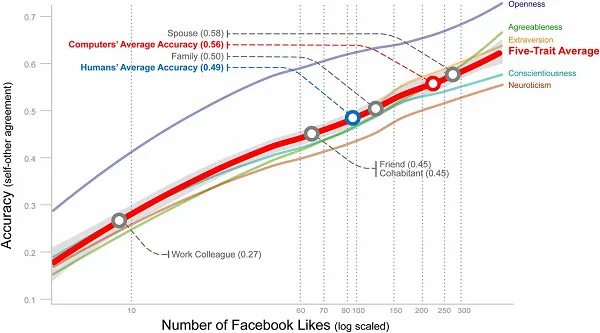# Meta’s AI Chatbot Reawakens Issues About Information Monitoring

Over the previous week, the specter of Meta’s probably intrusive knowledge monitoring has as soon as once more raised its head, this time as a result of launch of its new, personalised AI chat app, in addition to current testimony introduced by former Meta worker Sarah Wynn-Williams.
Within the case of Williams, who’s written a tell-all ebook about her time working at Meta, current revelations in her look earlier than the U.S. Senate have raised eyebrows, with Wynn-Williams noting, amongst different factors, that Meta can determine when customers are feeling nugatory or helpless, which it may well use as a cue for advertisers.
As reported by the Enterprise and Human Rights Useful resource Heart:
“[Wynn-Williams] mentioned the corporate was letting advertisers know when the kids have been depressed so that they may very well be served an advert at one of the best time. For example, she steered that if a teen woman deleted a selfie, advertisers would possibly see that as a great time to promote her a magnificence product as she might not be feeling nice about her look. Additionally they focused teenagers with adverts for weight reduction when younger women had issues round physique confidence.”
Which sounds horrendous, that Meta would knowingly goal customers, and teenagers no much less, at particularly weak occasions with promotions.
Within the case of Meta’s new AI chatbot, issues have been raised as to the extent at which it tracks consumer info, as a way to personalize its responses.
Meta’s new AI chatbot makes use of your established historical past, based mostly in your Fb and Instagram profiles, to customise your chat expertise, and it additionally tracks each interplay that you’ve with the bot to additional refine and enhance its responses.
Which, based on The Washington Publish, “pushes the boundaries on privateness in ways in which go a lot additional than rivals ChatGPT, from OpenAI, or Gemini, from Google.”
Each are important issues, although the concept that Meta is aware of a heap about you and your preferences is nothing new. Consultants and analysts have been warning about this for years, however with Meta locking down its knowledge, following the Cambridge Analytica scandal, it’s light as a difficulty.
Add to this the truth that most individuals clearly want comfort over privateness, as long as they will largely ignore that they’re being tracked, and Meta has usually been capable of keep away from ongoing scrutiny for such, by, basically, not speaking about its monitoring and predictive capability.
However there are many examples that underline simply how highly effective Meta’s trove of consumer knowledge may be.
Again in 2015, for instance, researchers from the College of Cambridge and Stanford College launched a report which checked out how folks’s Fb exercise may very well be used as an indicative measure of their psychological profile. The research had discovered that, based mostly on their Fb likes, mapped in opposition to their solutions from a psychological research, the insights may decide an individual’s psychological make-up extra precisely than their mates, their household, higher even than their companions.

Fb’s true energy on this sense, is scale. For instance, the knowledge that you just enter into your Fb profile, in isolation, doesn’t imply a heap. You would possibly like cat movies, Coca-Cola, possibly you go to Pages about sure bands, manufacturers and so on. By themselves, these actions won’t reveal that a lot, however on a broader scale, every of those components may be indicative. It may very well be, for instance, that individuals who like this particular mixture of issues have an 80% probability of being a smoker, or a legal, or a racist, whether or not they particularly point out such or not.
A few of these indicators are extra overt, others require extra insights. However principally, your Fb exercise does present who you’re, whether or not you meant to share that or not. We’re simply not confronted with it, exterior of advert placements, and with private posting to Fb declining in current occasions, Meta’s additionally misplaced a few of its knowledge factors, so that you’d assume that its predictions are seemingly not as correct as they as soon as have been.
However with Meta AI now internet hosting more and more private chats, on a broad vary of subjects, Meta now has a brand new stream of connection into our minds, which is able to certainly showcase, as soon as once more, simply how a lot Meta does know you, and what your private preferences and leanings could also be.
Which it does certainly use for adverts.
Meta does word in its AI documentation that “details that include inappropriate info or are unsafe in nature” will not be saved, whereas it’s also possible to delete the small print that Meta AI saves about you at any time.
So that you do have some choices on this entrance. However should you wanted a reminder, Meta is monitoring a heap of private info, and it has unmatched scale to crosscheck that knowledge in opposition to, which supplies it an enormous quantity of embedded understanding about consumer preferences, pursuits, leanings, and so on.
All of those may very well be used for advert focusing on, content material promotion, affect, and so on.
And sure, that could be a concern, which is value exploring. However once more, over time, and given variable controls over their knowledge, the capability to restrict info that Fb tracks, their privateness settings, and so on. Regardless of all of those choices, analysis exhibits that most individuals merely don’t limit such.
Comfort trumps privateness, and Meta might be hoping the identical rings true for its AI chatbot as properly. That’s additionally why its Benefit+ AI-powered adverts are producing outcomes, and as its AI instruments get smarter, and enhance Meta’s capability to investigate knowledge at scale, Meta’s going to get even higher at realizing all the pieces about you, as revealed by your Fb and Instagram presence.
And now you AI chats as properly. Which can certainly imply a extra personalised expertise. However the pay-off right here is that Meta may even use that understanding in methods it’s possible you’ll not agree with.
Andrew Hutchinson


![#
Survey Finds That Most Ladies Obtain Inappropriate Advances on LinkedIn [Infographic] #
Survey Finds That Most Ladies Obtain Inappropriate Advances on LinkedIn [Infographic]](https://www.socialmediatoday.com/imgproxy/UIzv72tgxo9imVByubSDBkSwbczlRG9ZJ7CZgihVLro/g:ce/rs:fill:770:435:0/bG9jYWw6Ly8vZGl2ZWltYWdlL2xpbmtlZGluX21lc3NhZ2VfaW5mbzIucG5n.png)

